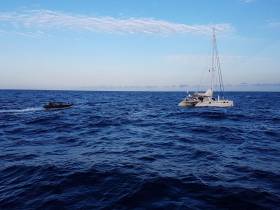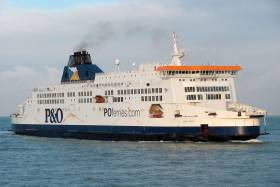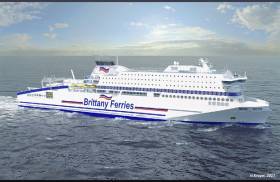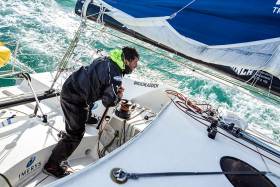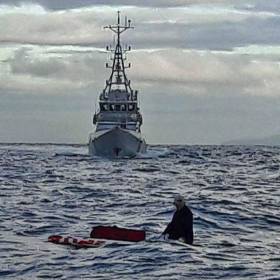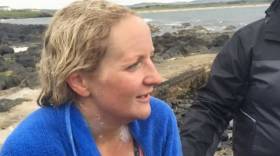Displaying items by tag: English Channel
Sail-Powered French Cargo-Operator to Launch English Channel Service Set for the New Year
A sail-powered French cargo shipping company, Grain de Sail is poised to launch an English Channel service early next year.
The Brittany-based group, founded in Morlaix in 2010, has activities spanning in wine, chocolate and coffee processing, maritime transport, import and export services and freight forwarding.
Grain de Sail will operate the 24-metre Grain de Sail (GDS) 1 with a capacity for 26 pallets on a route connecting France and Britain using the ports of St-Malo and Southampton. Passage times between the ports in Brittany and Hampshire will take between one and two days.
The company have plans to initially operate the route based on a single round trip a week. They are also to increase sailing frequencies by adding more cargo ships, Grain de Sail marketing director Stefan Gallard told The Loadstar.
“We’ll be carrying French goods, providing an LCL service by the pallet, and will be loading UK products on the return trip to France. With our pure sailing vessel we can exceed 90% carbon reduction. Future routes within UK and Ireland, as well as within Europe, are also under study".
More on the story here on the company that have added a newbuild, Grain de Sail II, which Afloat adds is custom-built and designed by French naval architect/builders, Piriou (see, unrelated Scilly story).
Afloat tracked the second much larger 238 pallet capacity cargo sailboat, which last week completed its delivery voyage to Saint Malo, its homeport. The newbuild is to operate on their existing St. Malo-New York, USA route.
The ethos of Grain de Sail is to couple sustainable seafaring and great organic gastronomic products. By selecting only products organically farmed and transporting them by cargo sailboat, the company try to have the lowest carbon footprint possible.
Since 2020, Grain de Sail have operated trans-Atlantic cargo-carrying voyages between Europe and the America’s, this has involved cargoes of organic and biodynamic French wines to New York City. Afterwards, it's down to Central America to load up on organic coffee and cocoa beans before returning home to Brittany, where Grain de Sail roasts the coffee and produces chocolates.
The round trips take around 3 months to complete and occur twice a year, in the Spring and in the Autumn.
Across the Celtic Sea to France where politicians unanimously have backed plans to introduce new laws to tighten employment laws for ferry operators on the English Channel.
The France-Channel Islands operator, Manche Îles Express, previously warned the change would pose recruitment challenges for the ferry firm as it would not be able to continue offering the same perks for staff.
According to ITV News, the new legislation is aimed to protect against the practice of "social dumping", where existing staff are replaced with overseas workers. In addition the replacement staff work for worse pay and conditions.
It was in March 2022 when P&O Ferries, which operates on the Dover-Calais route, North Sea and the Irish Sea, was accused of a similar act when it laid off nearly 800 members of staff and crew. They were replaced with agency workers and allegedly earning around £1.80/hour.
For more on the story click here.
In addition The Currency also reports on the new France law which follows on from a UK pay measure, the Seafarers Wages Bill which formed part of a nine point plan to improve pay and conditions for seafarers which was introduced in July last year.
The new French labour law aims to improve safety on English Channel crossings, however Irish Ferries believes it is about “safeguarding the interests of certain ferry operators who are in receipt of state subsidies”.
For further reading click the story.
Double Tragedy in English Channel Following Separate Overboard Incidents in Yacht Races
One sailor has died and the search for a second has been stood down following two separate incidents in cross-Channel races at the weekend, as Marine Industry News reports.
On Friday (26 May), a British man understood to be from the Greater Manchester area died after falling overboard from a yacht off the Normandy coast during the Royal Escape Race.
On the same day, a sailor understood to be a 68-year-old man from the Isle of Wight who was taking part in a race from Cowes to Deauville fell overboard some 15 miles from the finish.
A multi-agency search continued into Saturday but has since been stood down. Marine Industry News has more HERE.
Cowes - Deauville race statement
JOG Yacht Racing are deeply saddened to announce that a competitor was reported overboard during the Cowes to Deauville race on Friday 26th May at approximately 21:30hrs BST. The incident occurred some 15 miles from the finish in the Seine Bay off the Northern coast of France.
Following a Mayday call to the French rescue services, air rescue and lifeboats, together with nearby vessels and a number of competing boats, assisted in a search.
We are working with French authorities, and all concerned in establishing the full details and assisting with enquiries. The competitor's next of kin has been informed. Our thoughts and most sincere condolences are with the family at this difficult time.
A Statement from Sussex Yacht Club
We are deeply saddened by the tragic loss of one of our fellow sailors yesterday.
Sussex Yacht Club are working with the Police, Maritime and Coastguard Agency and the Marine Accident Investigation Bureau to assist with their enquiries.
Our thoughts and prayers are with the family, friends and supporting our fellow sailors at this difficult time.
* According to Sky News, the man was taking part in the 43rd Royal Escape Race, an event launched in 1977 to celebrate the Queen's silver jubilee.
Participants follow the route Charles II took aboard the coal barge Surprise from Shoreham-by-Sea to the Normandy port of Fecamp.
A spokesman for Sussex Police said: "Sussex Police were made aware of a man has sadly died in the English Channel after falling from a yacht in French waters in the early hours of Saturday morning. The incident is understood to have happened at around 2 pm on Friday.
In response to media reports on the RNLI’s humanitarian work in the English Channel, chief executive Mark Dowie has spoken of his pride in the efforts of the charity’s lifeboat volunteers.
“I could not be prouder of our amazing volunteer lifeboat crews, who launch to the aid of anyone who is in trouble in or around the water and needs our help,” he said. “We have done this since the RNLI was founded in 1824 and this will always be our ethos.
“Every year, our lifeboat crews and lifeguards rescue around 30,000 people. We do not judge a casualty on what circumstances have found them in trouble.
“Our crews are tasked by HM Coastguard in the UK and the Irish Coast Guard in Ireland to rescue anyone who is at risk of drowning. They go home after a shout secure in the knowledge that without their help, the person they rescued may not have been able to be reunited with their own family. That is why they do what they do.
“These same principles apply to our lifesaving work in the Channel. We do not judge those we rescue — where we believe there is a risk to life at sea, we will always launch in response to a call from HM Coastguard.
“We want to be absolutely clear that we are incredibly proud of the work our volunteer lifeboat crews do to rescue vulnerable people in distress.
“When our lifeboats launch, we operate under International Maritime Law, which states we are permitted and indeed obligated to enter all waters regardless of territories for search and rescue purposes.
“And when it comes to rescuing those people attempting to cross the Channel, we do not question why they got into trouble, who they are or where they come from. All we need to know is that they need our help.
“Our crews do what they do because they believe that anyone can drown, but no one should. They believe in and remain focused on our core purpose, along with every member of the RNLI, to save lives at sea.”
First-hand accounts from lifeboat volunteers in England’s south east who respond to emergencies in the English Channel can be found on the RNLI website HERE.
Catamaran With 'Significant Quantity of Cocaine' Seized off UK Involves Irish Defence Forces
#NavalService - A catamaran has been found with a "significant quantity of cocaine" when seized in the English Channel in an operation involving Irish Defence Forces.
As RTÉ News reported, five men have been arrested on suspicion of drug smuggling.
The UK’s National Crime Agency said that a Border Force boat intercepted the vessel off the southwest coast of Cornwall and escorted it to Newlyn Harbour.
An Irish Naval vessel (Afloat confirms as the L.E. William Butler Yeats) and an Air Corps maritime patrol aircraft took part in the inter-agency operation.
They conducted a surveillance operation off the south coast of Ireland prior to the detention of the vessel.
Further details of the drugs seizure operation can be read by clicking here.
The find comes just days after Revenue seized cocaine and MDMA worth some €3 million at Dublin Port, as TheJournal.ie reports.
English Channel Ferry Runs Aground In Calais
#FerryNews - An English Channel ferry with more than 200 passengers on board has run aground at Calais, according to the Guardian.
Local officials in the French port town report that there were no injuries when P&O’s Pride of Kent grounded on what is likely a sand bank in the harbour when attempting to depart for Dover amid severe weather this afternoon (Sunday 10 December).
The ferry is said to be “stable” and it is hoped that passengers can be transferred to another vessel today.
#NewBuild - Almost exactly a year after the Brexit vote, Brittany Ferries on Thursday confirmed an order for a new "£175m LNG cruiseferry for English Channel service.
The 42,400 gross tonnage newbuild (slighty larger to Pont-Aven of 41,000 on the Cork-Roscoff route) will be placed on the company’s busiest route Portsmouth-Caen from spring 2019 – as Brexit negotiations move towards completion.
The new ship will be named Honfleur after the charming seaside destination on the Seine estuary in Normandy. First details have been revealed today after contracts were signed with the Flensburger Schiffbau-Gesellshaft (FSG) shipyard in Germany.
Afloat adds FSG are currently constructing ICG's €144m euro newbuild cruiseferry for Irish Ferries. The 50,000 gross tonnage cruiseferry is due to enter operations by mid-2018.
As for Honfluer, she will be powered by LNG (liquefied natural gas) and promises to be the most environmentally-friendly vessel operating on the English Channel. LNG emits less carbon dioxide than diesel following combustion and burns with no smoke. It is entirely free of sulphur and produces very low emissions of nitrogen oxide and particulate matter.
In LNG-electric propulsion, four engines feed electric generators and two electric propulsion motors. This quieter and more efficient form of power delivery reduces vibration, meaning an even smoother ride for passengers.
Sharp on Code Red for Cross-Channel World Record Attempt
British offshore sailor Phil Sharp is on standby to attempt the outright monohull Sailing Speed Record for the English Channel.
At a time where the winter gales start to relentlessly beat up the shores of the British Isles, and boat-owners are putting their vessels firmly to bed, Phil Sharp, sailing Class 40 race yacht Imerys is now on Code Red Standby to attempt one of the fastest of the World Record-breaking routes, the cross-Channel Sailing Record.
After establishing last December’s Length of Britain Record with extreme adventurer Sean Conway, PS Racing have their sights set on the Channel Record route, one of the most established routes in offshore sailing. Launched in 1905 by King Edward VII, the ‘Cowes-Dinard’ has since taken place as an annual race and is ratified by the World Sailing Speed Record Council as the Official Cross-Channel route for Sailing Speed Records.
A total distance of 140 miles, Phil will be attempting to break the outright monohull record of 12 hours 1 minute and 31 seconds. This is currently held by offshore skipper Jean Luc Van Den Heede (VDH), who set the record back in 2004 in Adrien, a boat over twice the size of Imerys, with a length of 85 feet.
Skipper Phil Sharp comments: “This is a fast and exciting record that I have always wanted to take on, but it will be tricky to beat as our Class 40 Imerys, at just 40 foot, is less than half the length of the current record setter Adrien. This means we will have to wait for some very strong winds from the North and ensure that the boat is pushed right to its limit throughout the crossing.
“Imerys will need to average at least 12 knots over the entire 140 mile route, and timing will be key for the attempt. There are extremely strong tides on this route, passing through the Alderney Race which can see currents of up to 10 knots, so the departure time will be critical to try and make the most of the best wind and the strongest south-going tide.”
PS Racing’s experienced meteorologist, Jure Jerman is keeping a close eye on the longer range forecast in order to identify a precise weather window, Jure comments; “At the moment we are on standby in a Code Red situation until we see a clear weather opportunity for Phil’s attempt. There is a possible window that might open up towards the end of next week, with some very strong NE winds, and early next week we will have a much clearer idea on whether this looks probable.”
Phil will be delivering Imerys to Cowes this weekend where final preparations will be made ahead of a potential record attempt over the coming weeks.
Man Rescued From Paddleboard In English Channel
#Rescue - A German national clad in only shorts, a fleece and a hat was rescued from the English Channel seven miles off the British coast on Sunday morning (9 October).
But according to BreakingNews.ie, there have been conflicting reports as to how the stand-up paddleboarder wound up in his predicament, following his discovery by a diving team off Dover at first light.
First indications that the tourist had set off from France the night before to cross to the UK had been met with scepticism by one of the divers who first approached him.
“His claim was that he’d left [France] at midnight and had managed to paddle something like 14 odd miles in seven hours. It’s a bit odd,” diver Chris Webb told The Independent.
However, the Dover Marina Facebook page now says the paddler has been identified as Alexander Hahn, so set off a number of weeks ago from Coburg following the waterways of Germany and France towards Britain.
#SeaSwim - Charity worker Heather Clatworthy has become only the second swimmer to cross the Atlantic between the Inishowen Peninsula and Portstewart on the North Coast – and the first in nearly 90 years, according to the Irish Examiner.
The 34-year-old, who lives in Warwick with her family but grew up in Portstewart, crossed the expanse of open sea on Wednesday 27 July in around half the time expected, reaching the shore a little over four hours after setting out from Stroove beach in Moville.
“Two hours in I just didn’t think I was going to do it,” she said after powering through illness and choppy waters to complete her amazing feat, last achieved by famous English Channel swimmer Mercedes Gleitze in 1929.
The Belfast Telegraph has video of Clatworthy as she set out on her remarkable challenge:
In other sea swimming news, Galway long distance swimmer Alice Flood celebrated her swim across the English Channel earlier this week.
As the Galway Independent reports, the Bushy Park native made the gruelling crossing in just under 14 hours and joins an elite group of swimmers who've completed the England-to-France challenge.


























